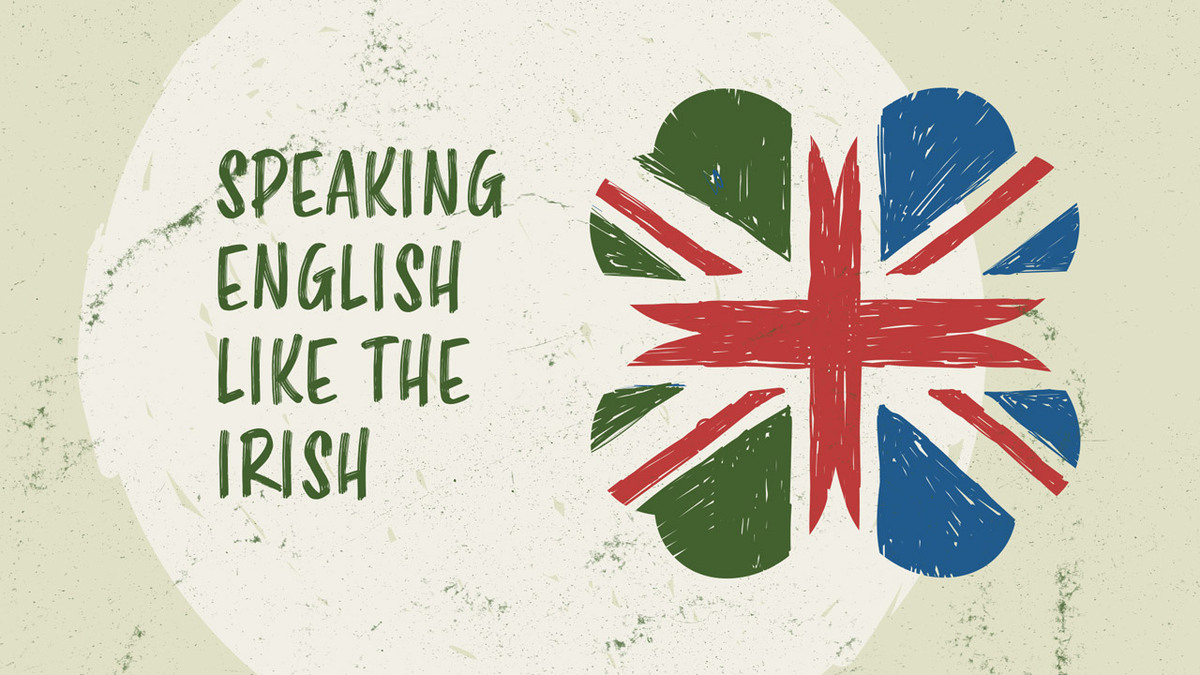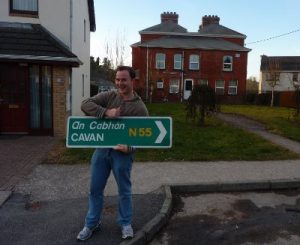How To Do an Irish Accent and Speak English Like the Irish
I’ve met many people during my travels who were curious about my Irish accent. When they weren’t doubtful about me being a native English speaker, they asked questions like “How can I do an Irish accent?” and “How can I speak like the Irish?”
I can’t deny it, we Irish speak in a special way.
In Ireland, we are lucky enough to be exposed to quite a lot of different versions of English thanks to television/cinema/literature. As well as our own TV channels, we have BBC, lots of American series, Australian soap operas and loads more.
However, the opposite just doesn't seem to be as true (although Irish literature has indeed had a huge impact on the English speaking world).
Other than poorly imitated Irish accents in films, the Irish dialect of English seems to elude a lot of people. So today, I'm going to break it down for you!
Maybe then you'll understand us better. At least, you will just not do such a terrible job when you try to mimic us. 😛
Table of contents
Why Do the Irish Speak Like That? (Accent and All)
Firstly, there's no such thing as an Irish accent.
Ireland may be a small island with a modest population, but the differences between regions and even within parts of cities like Dublin are vast and easy to pick up on.
Of course, other countries also have the same phenomenon. For example, there are dozens of English dialects within London alone, and there is no such thing as a “British accent”.
But I'll just focus on Ireland in this wee article. 😉
Despite there not being a ‘single' accent, there are commonalities that stem from a combination of factors.
Firstly, Irish (Gaeilge) was the dominant language of the country just a few generations ago. Even though fewer people use it now, the influence of the language on their English is huge.
For example, it is more common in Ireland to say that you have a language rather than you speak it. This is originally due to Irish's phrasing of Tá Gaeilge/Fraincis agam (“I have Irish/French.”)
There are also some traits of old English (due to earlier English colonisation attempts) that only the Irish have maintained.
Shakespeare himself used the word mitch, which is still common in Ireland. The rest of the English-speaking world would be confused to hear it; mitch means to skip classes or “play hooky”.
However, the main differences stem from influences from our own language. They are what make Irish (or Hiberno) English so much more colourful!
How to Do the Irish Accent
I have to say that I'm a bit disappointed in the rest of the Anglosphere. Frankly, the way you form words just doesn't sound nice!
Non-Irish English has actually driven me to avoid the language entirely for much of the last few years!!
South Africans are pretty much the only ones that could keep me in my chair without constantly glancing at the exit.
Let’s start by looking at a particular sound. Other English speakers have this strange thing they do where they put their tongue between their teeth and blow a buff of air over the tongue. They call it the th sound.
Why?? We do away with that hideous noise in Ireland! (Although it’s less likely in the north.) To us, the th sound is simply replaced with a t (unvoiced) or a d (voiced). So do ya see te tirty tree and a tird trees over dere? Dat's right!
Sounds way better, doesn't it!
Another example: other English-speakers seem to love putting consonants together that never belonged next to one another in the first place.
L & M for example… How can you say these so quickly at the end of a word? It's totally unnecessary! To us Irish, a film is pronounced fill-um. The Irish name Colm has two syllables.
This is because Irish, like Latin languages, gives vowels the glorious importance they deserve. Germanic and Slavic languages seem to have a thing for squeezing as many consonants together as possible…
And continuing from this… words in hard consonants! It's like an abrupt and unexpected car crash! Let's take things easy shall we? The ‘t' at the end of right is softened almost to a sh sound in the Emerald Isle. (Or even done away with altogether in North Dublin, and pronounced roy).
We also “ch” up our T and “j” up our D. The second day of the week is Chooseday, a ‘tube’ is a choob, and ‘due' and ‘jew' are pronounced the same.
And if you are spelling words for us, instead of imitating a pirate when you get to the R (aaaarrrrgh!!), just say it like ‘or' please 😉
Irish Has a Different Grammar
English grammar is pretty consistent, but the standard spoken form in Ireland takes on a life of its own.
For example, rather than rely on “to have just done” for a recently completed action, we would say “to be after doing”.
Examples: I'm after finding a euro on the road! You're after stepping in dog sh*t! (This is due to tá mé tar éis / i ndiaidh… in Irish)
Another interesting influence from Irish is its absolute lack of the words yes or no. When our ancestors were speaking English as a second language, they would translate affirmative or negative sentences from how they would say them in Irish.
Although international English influences mean young people do this way less nowadays, a lot of us Irish still simply don't use yes or no.
In the Irish language, this issue is resolved by simply repeating the verb of the question. Can you swim? I can! Do you like tomato juice? I don't. Are you coming? I amn't.
Yes you read that right: amn't. This is one I'm surprised other English speakers don't use! You say isn't, don't, aren't… It's logical if you ask me!
(This also happens in other languages, like Thai for example.)
Also, come on rest-of-the-English-speaking-world. A single word for both singular and plural “you”?? What were yee thinking??
We can say yee, yez, or even yous (depending on the part of the country).
Of course, Irish has tú and sibh… like pretty much every other language in the world! I'm pointing the finger at vi too, Esperanto!! 😛
How Do Irish People Talk? Some Strange Irish Turns of Phrase
Speaking like the Irish isn’t just about how to do an “Irish accent” (or one of them). You also have to learn our conversation “quirks”.
Story? Don't give out about your man! Where's the yoke?
These are very common things you would hear from an Irish person. Sadly I've had to water down my English over the years to be understood when abroad and avoid such interesting words.
Story? or What's the story? is a translation of the Irish Aon scéal? / Cad é an scéal?. “Story” means “news”, or “What's going on? / What's up?” It’s usually used as a greeting.
The more rural of us prefer “How's she cuttin?” (In Ireland, we use “she” a lot for inanimate objects).
Another example; To give out has nothing to do with distributing leaflets. This is from the Irish tabhairt amach and means “to complain”. Irish people are always surprised to hear that the expression isn't international!
Your man is a nice avoidance technique for not using someone's name. It is usually clear from the context who you're talking about, and the “your” definitely can't be taken literally. He may have no connection whatsoever to you and even be a complete stranger (although close friend is just as likely). Your one is for when we talk about women.
Yoke is a synonym for “thing”. It usually refers to something we may not be too familiar with and not know the actual name of. Think of thingamajig/watchamacallit, although we use yoke way more often.
This is just a small sampling! There are a host of other words like deadly, desperate, fair play, gas, press, shift that you may think you know the meaning of, but we would use them for things that are completely different, unrelated and unexpected. You can see loads of them (and a lot of things in this article) explained pretty well in the Wikipedia article on Hiberno English.
Let's see if I can give a few examples just to really confuse you…
Fair play to ya! You shifted your one, that was deadly! – The turnout was desperate last night. – I went to the press and found the yoke I had been looking for! … That's gas!
Then, of course, there are originally Irish words that we use even when speaking English. The most famous of these is craic (this is an Irish word, but is actually borrowed from English), “fun” or enjoyment, but also used to ask how things are How's the craic? Any craic?
Now You Can Start Speaking Like the Irish! (Or Try To…)
This post is only a small summary of the many differences, but hopefully it explains why us Irish sound so charming when we speak. 🙂 So, soften up your consonants, “trow” away your ‘th's, and stop giving out that you don't understand us 😉
Cheers! (That means thank you or bye by the way; no drinks necessary! Although, that's not just in Ireland! 😉 )




Social